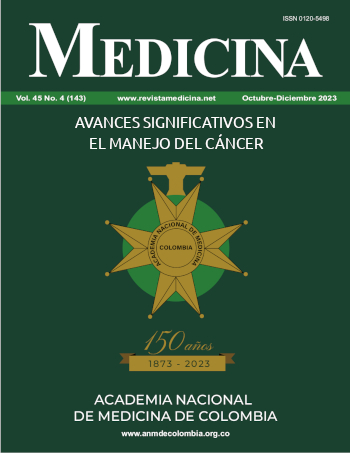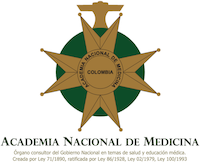Anticuerpos biespecíficos en mieloma múltiple: un nuevo paradigma
DOI:
https://doi.org/10.56050/01205498.2308Resumen
El mieloma múltiple (MM) es una enfermedad altamente heterogénea e incurable; aún con los grandes avances que ha tenido el campo en los últimos 20 años, la gran mayoría de los pacientes terminarán presentando recaídas sucesivas, con periodos libres de enfermedad cada vez más cortos. Los pacientes recaídos que han sido expuestos a agentes de los grupos de tratamiento disponibles (triple-expuestos, cuádruple-expuestos) o refractarios (MMRR), tienen opciones de tratamiento muy limitadas y un pronóstico ominoso. Los anticuerpos biespecíficos (AcBe) representan un mecanismo novedoso de acción; están diseñados para ligar al mismo tiempo un blanco en la célula tumoral y una célula T efectora citotóxica, lo que resulta en activación de esta última y muerte de la célula tumoral. En el caso del MM se han desarrollado AcBe dirigidos a nuevos blancos (BCMA, GPRC5D, CD38 y FcRH5), que han resultado en tasas de respuesta mayores al 50 % en la mayoría de los estudios, con repuestas profundas en un significativo porcentaje de los pacientes y un perfil de seguridad aceptable. Los eventos adversos (EA) más significativos son el síndrome de liberación de citoquinas (SLC), las citopenias y las infecciones; la mayoría manejables y con una baja tasa descontinuación y mortalidad relacionadas con EA. Teniendo en cuenta que la mayoría de los estudios involucran pacientes fuertemente tratados, los resultados sugieren que los AcBe se convertirán en un nuevo paradigma en el tratamiento de pacientes con MMRR. Seguramente los estudios en líneas más tempranas, en combinación con otros agentes activos cambiarán una vez más el panorama en el tratamiento del MM. La introducción de estos nuevos agentes a la práctica clínica supondrá varios retos que no se pueden dejar de mencionar. Su financiación significará una carga para los sistemas de salud del mundo, en especial en países de recursos medios a bajos. En segundo lugar, por tratarse de tratamientos indefinidos, será un reto asegurar la adherencia. Por último, el personal de salud tendrá que familiarizarse con los EA propios de esta nueva forma de inmunoterapia. Esta revisión se enfoca en los resultados de los principales agentes de los cuales disponemos información publicada de estudios fase 2.
Biografía del autor/a
Virginia Abello, Centro de Tratamiento e Investigación sobre Cáncer (CTIC)
Unidad Funcional Clínica Leucemia, Mieloma, Linfoma, Centro de Tratamiento e Investigación sobre Cáncer Luis Carlos Sarmiento Angulo (CTIC)
Paola Omaña, Centro de Tratamiento e Investigación sobre Cáncer (CTIC)
Unidad Funcional Clínica Leucemia, Mieloma, Linfoma, Centro de Tratamiento e Investigación sobre Cáncer Luis Carlos Sarmiento Angulo (CTIC)
Jorge Daza, Centro de Tratamiento e Investigación sobre Cáncer (CTIC)
Unidad Funcional Clínica Leucemia, Mieloma, Linfoma, Centro de Tratamiento e Investigación sobre Cáncer Luis Carlos Sarmiento Angulo (CTIC)
Referencias bibliográficas
Das S, Juliana N, Yazit NAA, Azmani S, Abu IF. Multiple Myeloma: Challenges Encountered and Future Options for Better Treatment. Int J Mol Sci. 2022;23(3).
Fondo Colombiano de Enfermedades de Alto Costo CdACC. Situación del cáncer en la población adulta atendida en el SGSSS de Colombia 2020. 2021.
Cancer IAfRi. Globocan Colombia 2020. [Internet].Organización Mundial de la Salud [Consultado junio 1 de 2023]. Disponible en: https://gco.iarc.fr/today/data/factsheets/populations/170-colombia-fact-sheets.pdf.
Abello V, Mantilla WA, Idrobo H, Sossa CL, Salazar LA, Pena A, et al. Real-World Evidence of Epidemiology and Clinical Outcomes in Multiple Myeloma, Findings from the Registry of Hemato-Oncologic Malignancies in Colombia, Observational Study. Clin Lymphoma Myeloma Leuk. 2022;22(6):e405-e13.
Gandhi UH, Cornell RF, Lakshman A, Gahvari ZJ, McGehee E, Jagosky MH, et al. Outcomes of patients with multiple myeloma refractory to CD38-targeted monoclonal antibody therapy. Leukemia. 2019;33(9):2266-75.
Yong K, Delforge M, Driessen C, Fink L, Flinois A, Gonzalez-McQuire S, et al. Multiple myeloma: patient outcomes in real-world practice. Br J Haematol. 2016;175(2):252-64.
Abello V, Sossa C, Mantilla W, Idrobo H, Quintero G. Mieloma Múltiple Recaído Refractario en Colombia: Reporte de los Investigadores de RENEHOC-ACHO. Congreso Nacional de Investigación ACHO2021.
Martinez-Cordero H, Abello V, Mantilla Duran WA, Gomez R, Reyes J, Idrobo H, et al. Outcomes after First Rescue Treatment in Patients with Relapsed or Refractory Multiple Myeloma in Colombia. Blood. 2021;138(Supplement 1):4745.
Kumar SK, Dimopoulos MA, Kastritis E, Terpos E, Nahi H, Goldschmidt H, et al. Natural history of relapsed myeloma, refractory to immunomodulatory drugs and proteasome inhibitors: a multicenter IMWG study. Leukemia. 2017;31(11):2443-8.
Mateos MV, Weisel K, De Stefano V, Goldschmidt H, Delforge M, Mohty M, et al. LocoMMotion: a prospective, non-interventional, multinational study of real-life current standards of care in patients with relapsed and/or refractory multiple myeloma. Leukemia. 2022;36(5):1371-6.
Dhanasiri S, Hollier-Hann G, Stothard C, Dhanda DS, Davies FE, Rodriguez-Otero P. Treatment Patterns and Outcomes in Triple-Class Exposed Patients With Relapsed and Refractory Multiple Myeloma: Findings From the Multinational ITEMISE Study. Clin Ther. 2021;43(11):1983-96.e3.
Morè S, Corvatta L, Manieri MV, Olivieri A, Offidani M. Real-world assessment of treatment patterns and outcomes in patients with relapsed-refractory multiple myeloma in an Italian haematological tertiary care centre. Br J Haematol. 2023;201(3):432-42.
Shim H. Bispecific Antibodies and Antibody-Drug Conjugates for Cancer Therapy: Technological Considerations. Biomolecules. 2020;10(3).
Lancman G, Sastow DL, Cho HJ, Jagannath S, Madduri D, Parekh SS, et al. Bispecific Antibodies in Multiple Myeloma: Present and Future. Blood Cancer Discov. 2021;2(5):423-33.
Frerichs KA, Broekmans MEC, Marin Soto JA, van Kessel B, Heymans MW, Holthof LC, et al. Preclinical Activity of JNJ-7957, a Novel BCMA×CD3 Bispecific Antibody for the Treatment of Multiple Myeloma, Is Potentiated by Daratumumab. Clin Cancer Res. 2020;26(9):2203-15.
Khanam R, Ashruf OS, Waqar SHB, Shah Z, Batool S, Mehreen R, et al. The Role of Bispecific Antibodies in Relapsed Refractory Multiple Myeloma: A Systematic Review. Antibodies (Basel). 2023;12(2).
Cho SF, Anderson KC, Tai YT. Targeting B Cell Maturation Antigen (BCMA) in Multiple Myeloma: Potential Uses of BCMA-Based Immunotherapy. Front Immunol. 2018;9:1821.
Fuller R, Moshier E, Jacobs SE, Tremblay D, Lancman G, Coltoff A, et al. Practicing Antimicrobial Stewardship: De-Escalating Antibiotics in Patients With Acute Myeloid Leukemia and Neutropenic Fever. Open Forum Infect Dis. 2020;7(5):ofaa138.
Moreau P GA, Bhutani M OA, Nooka AK MT, Rosiñol L, Mateos M-V, Bahlis NJ, et al. Long-term follow-up from MajesTEC-1 of teclistamab, a B-cell maturation antigen (BCMA) x CD3 bispecific antibody, in patients with relapsed/refractory multiple myeloma (RRMM). . J Clin Oncol. 2023;41:8011.
Raje N. Elranatamab, a BCMA Targeted T-Cell Engaging Bispecific Antibody, Induces Durable Clinical and Molecular Responses for Patients with Relapsed or Refractory Multiple Myeloma. Blood. 2022;120:388-90.
Lee H, Bumma N, Ryan Richter J, Dhodapkar M, Hoffman J, Jagannath S. Linker-MM1 study: Livonseltamab (REGN5458) in patients with relapsed/refractory multiple myeloma 2023; 41(16).
Chari A, Minnema MC, Berdeja JG, Oriol A, van de Donk NWCJ, Rodríguez-Otero P, et al. Talquetamab, a T-Cell-Redirecting GPRC5D Bispecific Antibody for Multiple Myeloma. N Engl J Med. 2022;387(24):2232-44.
Swan D, Murphy P, Glavey S, Quinn J. Bispecific Antibodies in Multiple Myeloma: Opportunities to Enhance Efficacy and Improve Safety. Cancers (Basel). 2023;15(6).
Pan D, Richter J. Teclistamab for Multiple Myeloma: Clinical Insights and Practical Considerations for a First-in-Class Bispecific Antibody. Cancer Manag Res. 2023;15:741-51.
Raje N, Anderson K, Einsele H, Efebera Y, Gay F, Hammond SP, et al. Monitoring, prophylaxis, and treatment of infections in patients with MM receiving bispecific antibody therapy: consensus recommendations from an expert panel. Blood Cancer J. 2023;13(1):116.
Noori M, Yazdanpanah N, Rezaei N. Safety and efficacy of T-cell-redirecting bispecific antibodies for patients with multiple myeloma: a systematic review and meta-analysis. Cancer Cell Int. 2023;23(1):193.
Reynolds G, Cliff ERS, Mohyuddin GR, Popat R, Midha S, Liet Hing MN, et al. Infections following bispecific antibodies in myeloma: a systematic review and meta-analysis. Blood Adv. 2023;7(19):5898-903.
Raje NS, Anaissie E, Kumar SK, Lonial S, Martin T, Gertz MA, et al. Consensus guidelines and recommendations for infection prevention in multiple myeloma: a report from the International Myeloma Working Group. Lancet Haematol. 2022;9(2):e143-e61.
Popat M, Usmani S, Garfall A, van de Donk N, Nahi H, San-Miguel J, et al. Updated results from MajesTEC-1: phase 1/2 study of teclistamab, a B-cell maturation antigen x CD3 bispecific antibody, in relapsed/ refractory multiple myeloma Oral presentation presented at: 63rd American Society of Hematology (ASH) Meeting & Exposition; December 11-14, 2021. 2021.
Usmani SZ, Garfall AL, van de Donk NWCJ, Nahi H, San-Miguel JF, Oriol A, et al. Teclistamab, a B-cell maturation antigen × CD3 bispecific antibody, in patients with relapsed or refractory multiple myeloma (MajesTEC-1): a multicentre, open-label, single-arm, phase 1 study. Lancet. 2021;398(10301):665-74.
Rodriguez Otero PdS, Anita Niels, Donna Reece Van de Donk , Wcj Chari, Ajai Krishnan, Amrita Martin, Thomas Mateos, et al. Teclistamab in combination with daratumumab, a novel, immunotherapy-based approach for the treatment of relapsed/ refractory Multiple Myeloma: updated phase 1B results. HemaSphere. 2022(6):89-90.
Searle E, Quach H, Wong SW, Costa LJ, Hulin C, Andrew S. Teclistamab in Combination with Subcutaneous Daratumumab and Lenalidomide in Patients with Multiple Myeloma: Results from One Cohort of MajesTEC-2, a Phase1b, Multicohort Study. Blood. 2022;140.
Raje N, Bahlis NJ, Bhagirathbhai Dholaria C, Lesokhin AM. Elranatamab, a BCMA Targeted T-Cell Engaging Bispecific Antibody, Induces Durable Clinical and Molecular Responses for Patients with Relapsed or Refractory Multiple Myeloma. Boold. 2022;140:380-90.
Lesokhin AM, Tomasson MH, Arnulf B, Bahlis NJ, Miles Prince H, Niesvizky R, et al. Elranatamab in relapsed or refractory multiple myeloma: phase 2 MagnetisMM-3 trial results. Nat Med. 2023;29(9):2259- 67.
Grosicki S, Mellqvist U-H, Pruchniewski Ł, Crafoord J, Koh Y. Elranatamab in Combination with Daratumumab for Patients (pts) with Relapsed/Refractory Multiple Myeloma (RRMM): Results from the Phase 3 Magnetismm-5 Study Safety Lead-in Cohort. Blood. 2022;140:4407-8.
Bumma N, Richter J, Brayer J, Zonder JA, Dhodapkar M, Shah MR, et al. Updated Safety and Efficacy of REGN5458, a BCMAxCD3 Bispecific Antibody, Treatment for Relapsed/Refractory Multiple Myeloma: A Phase 1/2 First-in-Human Study. Blood 2022;140(Supplement 1):10140–10141. doi: https://doi.org/10.1182/blood-2022-159969.
Chari A, Touzeau C, Schinke C, Minnema MC, Berdeja J, Oriol A, et al. Talquetamab, a G Protein-Coupled Receptor Family C Group 5 Member D x CD3 Bispecific Antibody, in Patients with Relapsed/Refractory Multiple Myeloma (RRMM): Phase 1/2 Results from MonumenTAL-1. Blood. 2022;140(Supplement 1):384–387. doi: https://doi.org/10.1182/blood-2022-159707.
van de Donk NWB, N. Mateos, M.-V. Weisel, K. Dholaria, B. Garfall, A. L. Goldschmidt, H. Martin, et al. S183: Novel combination immunotherapy for the treatment of relapsed/refractory multiple myeloma: Updated phase 1b results for talquetamab (a GPRC5D x CD3 bispecific antibody) in combination with daratumumab. . HemaSphere. 2022;6:24-5.
Tanenbaum B, Miett T, Patel SA. The emerging therapeutic landscape of relapsed/refractory multiple myeloma. Ann Hematol. 2023;102(1):1-11.
Moreau P, Garfall AL, van de Donk NWCJ, Nahi H, San-Miguel JF, Oriol A, et al. Teclistamab in Relapsed or Refractory Multiple Myeloma. N Engl J Med. 2022.
Touzeau C, A Cyrille A, Moreau P, Perrot A, Garfall AL. Efficacy and safety of teclistamab (tec), a B-cell maturation antigen (BCMA) x CD3 bispecific antibody, in patients (pts) with relapsed/refractory multiple myeloma (RRMM) after exposure to other BC- MA-targeted agents. Journal of Clinical Oncology. 2022;40:8013.
Mateos MV, Chari A, Usmani S, Moreau P. Indirect treatment (tx) comparison of teclistamab (tec) in MajesTEC-1 versus physician’s choice of therapy in the long-term follow-up of the CASTOR, POLLUX, EQUULEUS, and APOLLO trials in patients (pts) with triple-class exposed (TCE), relapsed/refractory multiple myeloma (RRMM). Journal of Clinical Oncology. 2022;40(16_Suppl 8034).
de Donk N, Moreau P, Delforge M, Mateos MV. Comparative efficacy of teclistamab (tec) versus current treatments (tx) in real-world clinical practice in the prospective LocoMMotion study in patients (pts) with triple-class exposed (TCE) relapsed/refractory multiple myeloma (RRMM). Journal of Clinical Oncology. 2022;40(16_suppl): 8016.
Amrita Y. Krishnan, Nooka AK, Chari A, Garfall AL, Martin TG, Nair S, et al. Comparative effectiveness of teclistamab versus real-world treatments for patients with triple-class exposed (TCE), relapsed/refractory multiple myeloma (RRMM). Journal of Clinical Oncology. 2022;40, no.16_suppl (June 01, 2022):8036.
Berdeja JG, Madduri D, Usmani SZ, Jakubowiak A, Agha M, Cohen AD, et al. Ciltacabtagene autoleucel, a B-cell maturation antigen-directed chimeric antigen receptor T-cell therapy in patients with relapsed or refractory multiple myeloma (CARTITUDE-1): a phase 1b/2 open-label study. Lancet. 2021;398(10297):314- 24.
Raab MS, Cohen YC, Schjesvold F, Aardalen K, De Vita S. P937: PRECLINICAL DISCOVERY AND EARLY FINDINGS FROM THE PHASE 1, DOSE-ESCALATION STUDY OF WVT078, A BC- MA-CD3 BISPECIFIC ANTIBODY, IN PATIENTS WITH R/R MULTIPLE MYELOMA. HemaShere. 2022;6(Suppl ):827-828. DOI: 10.1097/01. HS9.0000846616.21003.5d.47. Mateos M-VW, K. Dholaria, B. Garfall, A. L. Goldschmidt, H. Martin, T. G. Morillo, D. et al. Relapsed/refractory multiple myeloma: updated phase 1b results for talquetamab (a GPRC5D x CD3 bispecific antibody) in combination with daratumumab. HemaSphere. 2022;6:84-5.
Cómo citar
Descargas
Publicado
Número
Sección
Licencia
Copyright
ANM de Colombia
Los autores deben declarar revisión, validación y aprobación para publicación del manuscrito, además de la cesión de los derechos patrimoniales de publicación, mediante un documento que debe ser enviado antes de la aparición del escrito. Puede solicitar el formato a través del correo revistamedicina@anmdecolombia.org.co o descargarlo directamente Documento Garantías y cesión de derechos.docx
Copyright
ANM de Colombia
Authors must state that they reviewed, validated and approved the manuscript's publication. Moreover, they must sign a model release that should be sent.

| Estadísticas de artículo | |
|---|---|
| Vistas de resúmenes | |
| Vistas de PDF | |
| Descargas de PDF | |
| Vistas de HTML | |
| Otras vistas | |




